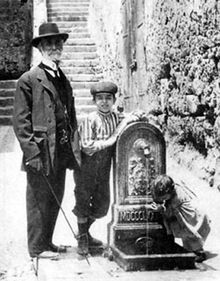Giuseppe Pitrè
Giuseppe Pitrè (born December 22, 1841 in Palermo ; † April 10, 1916 there ) was an Italian doctor , writer , collector , folklorist and university teacher .
life and work
Pitrè grew up in the Borgo, a district of Palermo. He was the son of the sailor Salvatore and Maria Stabile. When his father died of yellow fever in New Orleans in 1847 , Pitrè and his brother Antonio grew up with their maternal grandfather.
At the age of thirteen, Pitrè entered the Jesuit college in Palermo; In 1860 he fought as a volunteer in the Navy under Garibaldi . After Pitrè had completed his medical studies in 1865, he devoted himself to literature in addition to his medical profession. While Pitrè let himself be driven from patient to patient in his carriage in Palermo, he wrote scientific studies on Italian folklore culture and dealt with his extensive correspondence in his “outpatient study”.
From 1871 to 1913, Pitrè put together his main work, the " Biblioteca delle tradizioni popolari siciliane " (Library of Sicilian Folk Traditions), which comprises a collection of Sicilian dialect culture in 25 volumes. He dedicated the first volume to his mother. Pitrè also wrote essays on Goethe in Palermo and on the Divine Comedy . Pitrè married Francesca Vitrano in 1877. They had three children together.
In Florence in 1885, Pitrè published a collection of Tuscan stories. Pitrè founded the magazine Archivio per lo studio delle tradizioni popolari together with Vincenzo Di Giovanni and Salvatore Salomone Marino (1847–1916) and directed it until shortly before his death. In 1894, Pitrè published a basic bibliography of Italian folk traditions. In 1890, Pitrè was made an honorary member of the newly founded "American Folklore Society".
For his outstanding research on Sicilian traditions, Pitrè was appointed President of the “Royal Academy of Sciences” in Palermo in 1903 and was made Senator of the Kingdom on December 30, 1914 for his services . In addition, Pitrè was president of the “Società Siciliana per la Storia Patria (Sicilian Society for Patriotic History)”. In 1909, Pitrè was elected a permanent member of the Accademia della Crusca and in Palermo he founded the largest folklore museum in Sicily, Museo Etnografico Siciliano Giuseppe Pitrè .
In Sicily, Pitrè founded the study of "peoples' psychology", as he himself called folklore, and taught at the University of Palermo .
He is considered the most important author and scholar of the late 19th century on the popular customs of Sicily. Pitrè was friends with Frédéric Mistral .
The Pitrè Prize ( Premio Pitrè ) awarded by the Centro internazionale di Etnostoria in Palermo in collaboration with the museum is named after Giuseppe Pitrè , one of the world's most renowned awards for ethnologists.
literature
- Fabio Dei: Pitrè, Giuseppe. In: Raffaele Romanelli (ed.): Dizionario Biografico degli Italiani (DBI). Volume 84: Pio VI – Ponzo. Istituto della Enciclopedia Italiana, Rome 2015.
- Walter Keller: In memory of Giuseppe Pitrè. In: Swiss Archives for Folklore = Archives suisses des traditions populaires, Vol. 21, 1917, pp. 94–96 ( digitized version ).
Web links
- Entry in the Senatori dell'Italia liberale database of the Historical Archives of the Italian Senate
- Entry in the Archivio biografico comunale of Palermo
- List of members of the Accademia della Crusca
- Giuseppe Pitrè. In: WorldCat
Individual evidence
- ^ Walter Keller: In memory of Giuseppe Pitrè . Swiss Archives for Folklore = Archives suisses des traditions populaires, vol. 21, 1917, p. 95, accessed on July 31, 2020.
| personal data | |
|---|---|
| SURNAME | Pitrè, Giuseppe |
| BRIEF DESCRIPTION | Italian doctor, writer, collector, anthropologist and university professor |
| DATE OF BIRTH | December 22, 1841 |
| PLACE OF BIRTH | Palermo |
| DATE OF DEATH | April 10, 1916 |
| Place of death | Palermo |
